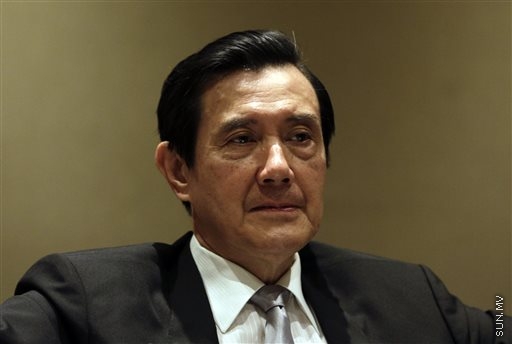
TAIPEI, Taiwan (AP) — China called on Taiwan on Wednesday to stay the course of deepening exchanges between the sides following a stunning electoral defeat for the island's ruling pro-China Nationalist Party.
The statement posted to the website of the Cabinet's Taiwan Affairs Office followed Taiwanese President Ma Ying-jeou's announcement that he is stepping down as party chairman to take responsibility for the loss of nine city and county elections over the weekend.
The election results reflected concerns over Ma's moves to integrate Taiwan's economy with China's, seen by many as a step toward Beijing's goal of gaining political control over the island.
Greater interaction between the sides has brought "tangible benefits" to both, Taiwan Affairs Office spokesman Fan Liqing was quoted as saying in the statement.
"We hope that ... exchanges and cooperation in all fields will continue to deepen and the people development of relations between the two sides will continue to advance," Fan said.
Ma is expected to formally tender his resignation on Wednesday after nine years as party chairman, although he will remain president for the final two years of his second four-year term.
"Over the last 120 years, the Nationalist Party has encountered countless failures, but has never been categorically defeated and each time we pick ourselves back up again," Ma said in a statement issued Tuesday. "Let us take today's loss and turn it into a new victorious beginning."
The Nationalists losses on Saturday included defeats in longtime strongholds Taipei, the capital, and the major central city of Taichung. The main opposition Democratic Progressive Party that favors formal independence for the island picked up seven of those seats, with independents winning two others.
China claims Taiwan as part of its territory and has vowed to respond to any formal independence declaration with force.
Young Taiwanese blame competition from China for suppressing wages, and there is little enthusiasm here for merging the island's vibrant democracy with Beijing's authoritarian one-party system.
Niu Jun, a Taiwan expert at China's Peking University, said the trend of closer economic ties across the Taiwan Strait probably is irreversible. But he said the election results reveal the discontent among young voters and those in basic industries over their failure to share in the fruits of Ma's policy of strengthening ties with China.
"So it is a question whether the benefits of the cross-Strait relations have been shared by the whole society, and Ma failed to take enough notice of that," Niu said.
The electoral battering puts the Nationalist Party on the defensive ahead of the 2016 presidential election. Two potential Nationalist candidates to succeed Ma as president — Vice President Wu Den-yih and outgoing Taipei Mayor Hau Lung-bin — resigned their party vice chairman posts following the election defeats.
A former Japanese colony, Taiwan split from the Chinese mainland amid civil war in 1949. Although the sides have no formal relations, the Nationalists have engaged extensively with China's ruling Communist Party in recent years.
Since 2008, Taiwan and China have signed 21 trade, transit and investment agreements, but protesters in March occupied parliament in Taipei to stop ratification of a China trade liberalization deal.
Following the weekend elections, Premier Jiang Yi-huah and his Cabinet members tendered their formal resignations but remained on as a caretaker government.
Having lost his authority over Nationalist lawmakers, Ma could find it harder to convince them to support his pro-China policies such as the stalled trade deal, said Lai I-chung, vice president of Taiwan Think Tank.
"Controversial deals in the legislature won't be able to see the light of day," he said.